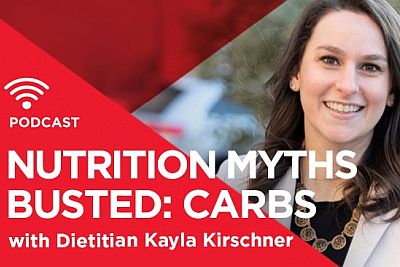Confused by carbs? You’re not alone.
For decades we’ve been hearing about “good” and “bad” carbs, low-carb-diets like Atkins and Paleo, and glycemic “spikes” caused by carbs.
Even today, headlines about carbs can leave you wondering if you’re not eating enough of them—or you should avoid them altogether!
We talked with a dietitian to separate the facts from the myths about carbs.
Here, we shed light on what carbs are, why they matter, and why they aren’t the dietary villain you might think they are.
An Essential Building Block

Caitlin Heisler, RD, LD
According to Aramark dietitian Caitlin Heisler, RD, LD, much of the negative press about carbs stems from the fact that not all carbohydrates are equal from a health and nutrition standpoint.
Carbohydrates play a vital role in a balanced diet and are essential for good health.
In fact, the US Dietary Guidelines for Americans recommend that about 45%-65% of our daily calories come from carbohydrates. As researchers have learned more about carbohydrates and health, they’ve found that the quality of carbohydrates you eat is at least as important as the quantity.
There are three different types of carbohydrates—sugar, starches, and fiber. And each can be categorized as simple carbs or complex carbs.
Sugar
 Sugar is the simplest form of carbohydrate. It occurs naturally in some foods, including fruits, vegetables, and milk and other dairy products.
Sugar is the simplest form of carbohydrate. It occurs naturally in some foods, including fruits, vegetables, and milk and other dairy products.
Types of sugar include fruit sugar (fructose), table sugar (sucrose) and milk sugar (lactose).
Many sweets, like candy, cookies, ice cream, and cakes contain added sugars. And other everyday foods where you might not expect added sugars often have them, too. Check out the nutritional info on your favorite foods for a glimpse into added sugars.
Added sugars provide calories—but little or no nutritional value. That’s why they’re sometimes called “empty calories.”
“It’s important to choose your carbohydrates wisely. Limit nutrient poor foods like soda, pastries, candy, and other foods high in added sugars,” says Caitlin. “Instead, opt for nutrient dense whole foods like whole grains, fruits, vegetables, fermented foods like low-sugar yogurt and kefir, beans and legumes.”
Sugar is often demonized in the media. However, not all sugars are the same.
For instance, while fruit and milk contain sugars, they are naturally occurring and come with vitamins, minerals, and other nutrients that our bodies need.
“Many people I talk to mistakenly think that they should avoid fruit and dairy because they’ve heard they are high in sugar,” says Caitlin. “But both fruit and dairy, while they have sugars, are also rich in essential vitamins and minerals. They are carbs that we should feel good about including in meals and snacks.”
Starch

Get Recipe: Asian Teriyaki Noodles
Starches are a complex carbohydrate. Technically, this just refers to the complex connection or combinations of the sugars.
Starches occur naturally in vegetables, grains, and cooked beans, peas, potatoes, and many other foods.
There’s a wide variation in how quickly different starchy foods are digested, depending upon the ingredient itself and how it’s cooked and other factors.
Some starchy foods like whole grain breads, fruits, vegetables, and beans are digested relatively slowly—a positive since slow digestion leads to a more gradual and sustained rise in blood sugar, as opposed to the sharp “spike” and crash that can happen with sugar.
Some other starchy foods like white potatoes without their skins, or white rice and white bread, are digested more quickly.
A “glycemic index” number provides more information on how quickly a carb will be digested and can be a helpful tool for people who are focused on how foods affect their blood sugar. For those interested in learning more about the glycemic index, there is more information available here.
Fiber
Fiber is a complex carbohydrate that occurs naturally in fruits, vegetables, whole grains, and cooked beans and peas.
Dietary fiber includes the parts of plant foods your body can’t digest or absorb. It passes relatively intact through the digestive tract and out of your body.
Fiber plays an important role in satiety (staying full), digestion, and heart health.
 Why Are Carbs So Important?
Why Are Carbs So Important?
There are tons of benefits that can be gained from good-for-you carbs.
For optimal health, we need a variety of foods that include the three macronutrients (protein, carbohydrates, and fat) as well as vitamins and minerals.
Energy
Carbohydrates are the body’s primary source of energy—and the brain’s preferred energy source.
“The body can store extra glucose (sugar) and then draw on that reserve during intense physical activity,” says Caitlin. “For most of us, however, a moderate walk or swim doesn’t require carb-loading. If you’re just out for a stroll, there’s no need for an energy bar or snack to keep you going.”
When we don’t meet our carbohydrate needs, the body will automatically look for another energy source, turning to protein in muscles and body fat for energy.
Digestive Health

Learn more about carbs in this podcast.
Carbohydrates are also key to maintaining digestive health as they provide food for gut bacteria.
The microbiome is an enormous collection of microbial organisms that live on and in the body, most of them within the gastrointestinal tract or the gut. Caitlin says that many of these microbes are healthy bacteria that help support immune health and digestion.
“Some carbohydrates, such as fiber, act as food for the good bacteria in the gut and promote their growth,” Caitlin says. “Eating foods high in fiber, like fruits, vegetables, and whole grains can also help with regularity, and help lower cholesterol and blood sugar.”
Heart Health and Anti-Cancer Benefits
Studies also show that quality carbohydrates found in vegetables, legumes, and whole grains can benefit cardiovascular health, can lower the risk of type 2 diabetes, and may even reduce the risk of some types of cancer.
Adding Quality Carbs to Your Life
The bottom line? Carbs—especially the “good” ones—will give you the fuel you need to power your day and your life.
If you want ideas for adding healthy carbs to your pantry—or tasty recipes to get your family excited about mealtimes, read the blog Choosing the Right Carbs to Fuel Your Life or check out our Recipes section.
Note: Since everyone’s health history and nutritional needs are so different, please make sure that you talk with your doctor and a registered dietitian to get advice about the diet and exercise plan that‘s right for you.

